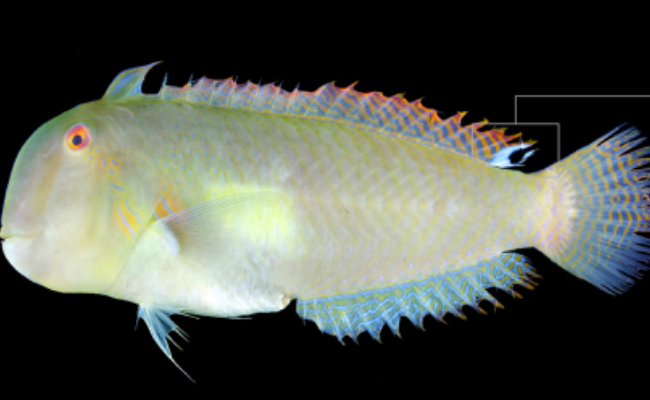LOOK: Newly discovered fish species was first spotted in a Bohol public market

The eclipse-spot razor wrasse, scientifically known as Iniistius bakunawa. | Photo by H. Motomura
In the bustling fish markets of the Philippines, a vibrant and peculiar sight caught the attention of scientists—an orange-eyed sea creature with an air of mystery. This chance encounter marked the beginning of an exciting discovery in the world of marine biology.
Meet the eclipse-spot razor wrasse, a newfound species that unveiled itself in the most unexpected of places.
The eclipse-spot razor wrasse, scientifically known as Iniistius bakunawa, boasts a striking appearance. With its pale yellowish to jade green body adorned with reflective scales, and a distinctive black and white eyespot at the tip of its dorsal fin, this fish stands out in the underwater world. Its flat body and knife-like features hint at its razor wrasse lineage—yet its unique characteristics set it apart.
Enigmatic species
The journey to identifying this enigmatic species began when Kent Elson Sorgon from the University of the Philippines Los Baños first acquired a specimen from a local market in Loay, Bohol in 2018.
“We described I. bakunawa from specimens collected from public markets in the Philippines and trawl specimens from Western Australia, speaking to the rich diversity of the Philippines’ reef fisheries and the poorly understood nature of fishes like this species that live in sandy habitats,” wrote Sorgon on Facebook.
Recognizing its resemblance to the razor wrasse but noting its peculiarities, the scientific community embarked on a quest to uncover its secrets. They procured six more specimens from various fish markets across the country, including Panay, Cebu, and Jolo, and discovered two preserved fish in Australian museum collections.
Through meticulous analysis, the eclipse-spot razor wrasse was officially recognized as a species that was previously unknown to science.
Razor wrasse species
Despite this revelation, its natural habitat and behavior remain shrouded in mystery. Other razor wrasse species are known to inhabit sandy locales such as “seagrass meadows or wide sand channels,” says Sorgon, employing their unique ability to dive into the sand when threatened. Whether the eclipse-spot razor wrasse shares these habits is yet to be determined.
This discovery adds another layer to the rich tapestry of marine life, reminding us that our oceans hold countless secrets waiting to be unraveled. The eclipse-spot razor wrasse’s name pays homage to Bakunawa, a serpentine figure in Visayan mythology believed to cause lunar eclipses by devouring the moon.
As marine biologists delve deeper into the world’s underwater wonders, they continue to shed light on the astounding diversity of life beneath the waves.
RELATED STORIES
Fishers in Bohol town want whale sharks out
Ahong Chan calls meeting to address dynamite fishing in Punta West
DOT takes action on ‘overpricing’ of seafood in Virgin Island, Bohol
Disclaimer: The comments uploaded on this site do not necessarily represent or reflect the views of management and owner of Cebudailynews. We reserve the right to exclude comments that we deem to be inconsistent with our editorial standards.
